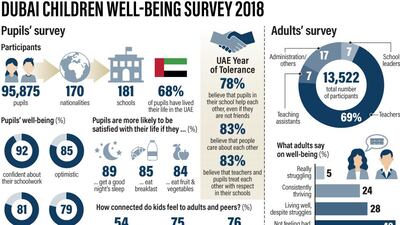Almost half of school staff in Dubai admit they are only 'just getting by' while one in five pupils do not feel satisfied, a new well-being survey by the emirate's education regulator has found.
The results of the Dubai Student Wellbeing Census and the Adults@School Wellbeing Survey - released by the Knowledge and Human Development Authority (KHDA) - have prompted calls for schools to do more to help pupils and teachers to couple to cope with the mental demands of life in the classroom.
For the first time, members of staff as well as pupils were covered in the census.
More than 95,000 pupils from 181 schools were polled along with 13,522 staff members, from principals and teachers to assistants and support staff.
The report found that 81 per cent of pupils are optimistic about the future, with 19 per cent saying they are not satisfied.
The survey also revealed that 54 per cent of pupils feel connected to staff at school, but the remainder struggle to forge a bond.
The staff survey found 43 per cent of adults in schools were 'just getting by or just functioning', with five per cent conceding they were 'struggling' in the well-being chart.
There was an age divide, with older members of staff, in the 55 and over group, happier than those aged 24 to 54.
Rashmi Nandkeolyar, principal of Delhi Private School said the KHDA study was of vital importance, as it took into account the mental health of students and adults in schools and did not merely measure growth in terms of academic results.
Ms Nandkeolyar said her school planned to run awareness campaigns on subjects highlighted in the report, from building closer ties between teachers and pupils, to the need for learners in senior years to get a goodnight’s sleep.
“There is more that needs to be done and that is quite clear,” she said.
“We will run campaigns and create awareness on how important sleep is to be productive and flourish. We will also encourage teachers to connect more with students.
“There is hope because as teachers grow older, probably due to experience, the numbers show they flourish compared to the younger teachers.
“But it is worrying that teachers seem to be struggling compared to assistants and school leaders who appear happy.
“We must actively work to change that. We also need to work on the vulnerable group, the 43 per cent who are 'just getting by'. We need to take proactive steps to move this group forward.”
Ms Nandkeolyar was among more than 100 principals who attended a workshop organised by the KHDA in Hatta last week to share their experiences and understand the data generated by the wellbeing report.
“All schools will work towards making small but critical changes that will help those who are struggling to move up. It’s only when awareness is created that we can improve and we are on the right path,” she said.
“It was a good retreat because we had open discussions and one important point to emerge was the need to form connections.”
Another finding was that 66 per cent of senior pupils used an electronic device just before they went to bed each day.
Some schools have banned mobile phones to combat the digital distraction within the campus.
Vatsala Mathai, principal of Elite English School, said the school conducted periodic checks and confiscated mobile phones from pupils. The seized phones were returned only at the end of the academic year.
Pupils were permitted laptops and tablets in school when these devices were required by teachers.
“We need the help of parents to reduce addiction to mobiles and social media. Sometimes we have found that parents, particularly younger parents, give their children mobile phones to avoid engaging with them,” she said.
“We need to make some effort to talk to children or they will spend unnecessary time on devices.
“Promoting the well-being of students is a challenge that can only be addressed with consistency and innovative ideas. We have asked teachers to talk more to their students because parents often don’t get the time to chat with their children.
“Teachers can speak about life and lessons they have learnt to get students to listen.”

